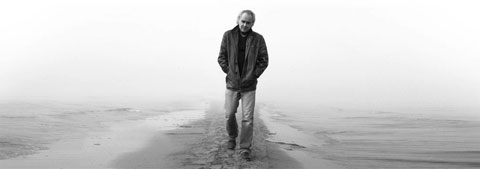Bob Lanois

"An invitation to collaborate with my brother, master arranger/musician Daniel Lanois took us on the trip of a lifetime through our family's Quebecois roots and ancient European history, driven by the pulse of the big city of Toronto. He enabled my fledgling harmonica style to emerge from a hidden place in the woods to meet the world.”
— Bob Lanois
When you have a superstar for a brother, it’s hard not to hit him up for a little help from time to time. Bob Lanois embarked on creating his first solo album with a musical god on his side. Younger brother Daniel is spoken of in the hushed tones reserved for a deity. And why not, it was U2’s Bono who referred to him as the best musician he has ever known, while “Rolling Stone” gushed that he was “the most important record producer to emerge in the ’80s.”
A celebrated engineer and producer himself, Bob stepped away from the knobs and dials of the control room, and, freed from the tangle of cables and microphones, took a chance with his own collection of songs — varied, moody, engaging instrumental pieces — produced by the genius of Daniel.
“I totally had to ‘give’ while working with Dan,” says Bob. “He demands it and is somewhat of a shaman that way in that he will trick you into revealing your true self.” Bob’s first solo project, “Snake Road” is an exit ramp off the superhighway of contemporary sonic exploration. It envelops the past, while pushing another envelope on what today’s — or even tomorrow’s — music should sound like.
“It’s forward moving. I believe I am more a futurist than I am a traditionalist,” proffers Bob. “I would rather plunge into the future. You can hear it on ‘Snake Road’.” What you will hear is the signature dream like landscape of Daniel, with the surprisingly lithe harmonica of brother Bob piercing and challenging the rich, shifting textures of ethereal backdrop.
The nine tracks on “Snake Road” are anything but ignorable. Nor is the fact that Bob has been on the cutting edge of ambient since Eno spent two years living at his house while pioneering the sound at Grant Avenue Studio in the early 1980s. While it’s hard to imagine the rough and tumble, blue collar streets of Steeltown as a womb for music that’s been referred to as “room colouring” and “sonic wallpaper”, that’s how the story goes.
“Ambient music was born in Hamilton, Canada,” Bob will tell you.
That’s where Daniel and Eno worked on seminal Eno recordings like “On Land” (1982) and “Apollo: Atmospheres and Soundtracks” (1983) — in the studio designed and built by Bob.
While the word “ambient” is literally defined as surrounding and encircling, it doesn’t, according to its creator, necessarily define “Snake Road”. “I don’t consider ‘Snake Road’ an ambient record,” Bob says. “I consider it a timeless piece of work that could have been made at any time in history.”
In fact, he continues, every cut on “Snake Road” has a distinct and memorable melody based on a standard structure of verse, chorus and modulated breaks. “Each and every one is, in fact, a classically crafted piece of arrangement genius of a very structured kind,” says Bob. “It’s almost the opposite of ambient where chance and randomness could even be an element.”
“Snake Road” is not Bob’s first foray into playing on an album, but this record is the first project he can take ownership of — his first solo release. Bob played harmonica on the critically acclaimed “The Shack Recordings” Volume 1” (2005) with Tom Wilson (Junkhouse and Blackie and the Rodeo Kings), an album he also co-produced with the triple Juno winner.
Look for a sequel soon.
“Tom’s been hounding me every day for the last year, ‘When are we going to start?’ he keeps asking.”